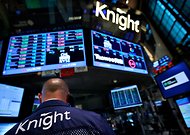 Brendan McDermid/ReutersErrant trades from the Knight Capital Group began hitting the New York Stock Exchange almost as soon as the opening bell rang on Wednesday.
Brendan McDermid/ReutersErrant trades from the Knight Capital Group began hitting the New York Stock Exchange almost as soon as the opening bell rang on Wednesday.
The Knight Capital Group confirmed on Monday that it had struck a $400 million rescue deal with a group of investors, staving off collapse after a recent trading mishap, even as the New York Stock Exchange temporarily revoked the firm’s market-making responsibilities.
The rescue package, which was arranged by the Jefferies Group, includes investments from TD Ameritrade and the Blackstone Group. Getco and Stifel, Nicolaus Company were also involved.
“We are grateful for the support of these leading Wall Street firms that came together to invest in Knight,” Tom Joyce, the firm’s chairman and chief executive, said in a statement. “The array of participants in this capital infusion underscores Knight’s critical role in the capital markets.”
In a regulatory filing, Knight Capital said the investors agreed to purchase $400 million of the brokerage firm’s preferred stock. Under the terms of the deal, Knight will also expand its board by adding three new members.
The deal could provide the investors with more than 260 million shares of the firm, affording the investors the right to buy the shares at $1.50 a piece, according to the statement. Last week, before the trading blunder, the firm’s shares closed over $10.
The rescue deal will hugely dilute existing shareholders of the company. In mid-morning trading, shares of Knight Capital were down 24 percent.
The lifeline was assembled in the wake of Knight Capital’s disclosure of a $440 million trading loss. The loss stemmed from a technology error that occurred on Wednesday when the firm unveiled new trading software, a glitch that generated erroneous orders to buy shares of major stocks. The orders affected the shares of 148 companies, including Ford Motor, RadioShack and American Airlines, sending the markets into upheaval.
Knight Capital said it reached the deal on Sunday, and it expected to close the transaction on Monday. It was a rapid a recovery for a firm that just days ago was facing collapse.
Still, the firm faces significant challenges. The New York Stock Exchange said on Monday it “temporarily” reassigned the firm’s market-making responsibilities for more than 600 securities to Getco, the high-speed trading firm that also invested in Knight. Market makers buy and sell securities on behalf of clients.
The move, the exchange said in a statement on Monday, was a stop-gap measure needed until the investor deal was final. Once the recapitalization plan is complete, Knight will resume its duties.
“We believe this interim transition is in the best interests of investors, our listed issuers, market stability and efficiency, as well as Knight, as the firm finalizes its equity financing transaction,” Larry Leibowitz, chief operating officer of NYSE Euronext, said in the statement.
Knight Capital also faces heavy regulatory scrutiny. The Securities and Exchange Commission is examining potential legal violations as it pieces together the firm’s missteps.
The problems for Knight Capital began at the start of trading on Wednesday. The firm tweaked its computer coding to push itself onto a new trading platform that the New York Stock Exchange opened that day. Under this program, trades from retail investors shift to a special platform where firms like Knight compete to offer them the best price.
But when Knight’s new system went live, the firm “experienced a human error and/or a technology malfunction related to its installation of trading software,” the firm explained in the filing on Monday.
Chaos ensued. The error caused Knight to place unauthorized offers to buy and sell shares of big American companies, driving up the volume of trading and causing a stir among traders and exchanges.
Knight had to sell the stocks that it accidentally bought, prompting a $440 million loss. The loss drained Knight’s capital cushion and caused “liquidity pressures,” the firm said in the filing.
“In view of the impact to the company’s capital base and the resultant loss of customer and counterparty confidence, there is substantial doubt about the company’s ability to continue as a going concern,” the filing said.
Knight and its chief executive, Thomas M. Joyce, began contacting potential suitors for parts of the business, and the firm consulted restructuring lawyers on a potential Chapter 11 filing, according to the people with direct knowledge of the matter.
But events soon turned in the firm’s favor.
The firm secured emergency short-term financing that allowed it to operate on Friday, and it used Goldman Sachs to buy at a discount the shares Knight had erroneously accumulated.
Some of the firm’s biggest customers, including TD Ameritrade and Scottrade, said that they had resumed doing business with Knight by Friday afternoon.
The firm capped its efforts to stay afloat on Sunday with the rescue deal. Knight expects to finalize the agreement on Monday morning and detail the financing terms in a regulatory filing.
“Knight’s financial position and capital base have been restored to a level that more than offsets the loss incurred last week,” Mr. Joyce said in a statement. “We thank our clients, employees and partners for their steadfastness during a brief yet difficult period and we are getting back to business as usual.”
Knight was advised by Sandler O’Neill and Wachtell, Lipton, Rosen Katz. Barclays is TD Ameritrade’s financial advisor.
Article source: http://dealbook.nytimes.com/2012/08/06/knight-capital-confirms-lifeline-loses-market-making-duties/?partner=rss&emc=rss